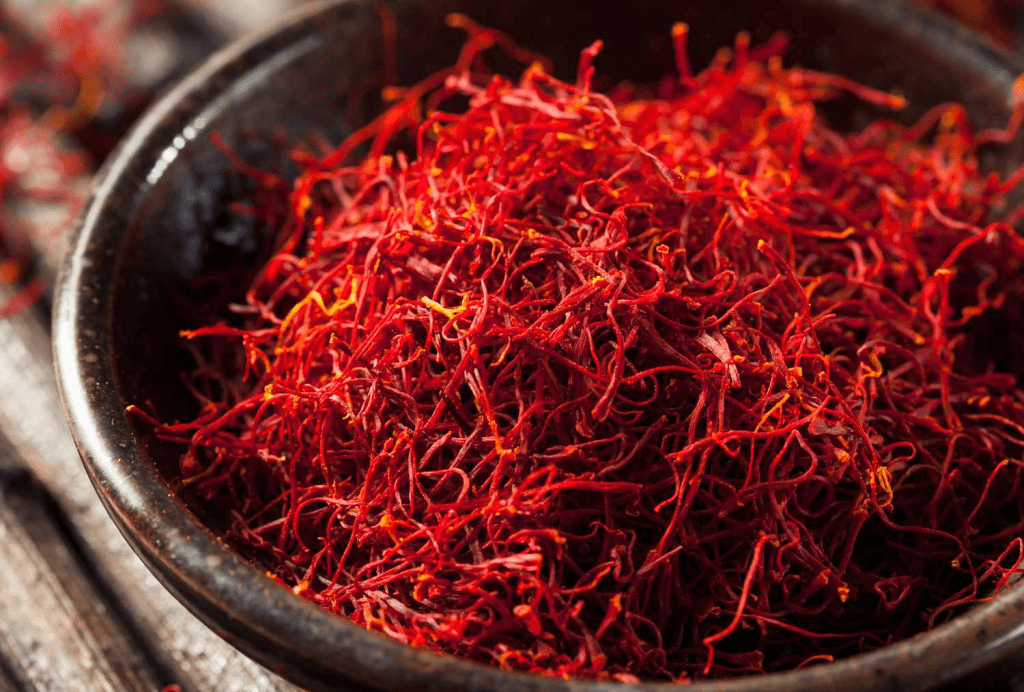When it comes to superfoods, saffron is often overshadowed by trendier names like turmeric or spirulina. But don’t underestimate this vibrant golden-red spice. Known for its rich color, distinct aroma, and culinary value, saffron is also packed with powerful antioxidants that could be your eyes’ best friend.
Let’s dive into the science-backed benefits of saffron for eye health — and why adding a pinch to your daily routine might help protect your vision as you age.
What Is Saffron, Really?

Saffron comes from the dried stigmas of the Crocus sativus flower and has been used for centuries in traditional medicine. While it’s best known as a cooking spice and a natural dye, saffron’s high concentration of crocin, crocetin, safranal, and kaempferol gives it serious medicinal potential — especially for the eyes.
These unique compounds have antioxidant, anti-inflammatory, and neuroprotective properties, making saffron more than just a pretty flavor enhancer.
Protecting the Retina: Saffron’s Superpower
Your retina is the delicate layer at the back of the eye responsible for capturing light and sending visual signals to your brain. Over time, oxidative stress and inflammation can damage this layer, leading to vision loss.
Here’s where saffron comes in.
Studies show that saffron can help protect retinal cells from oxidative damage. The compound crocin found in saffron has been shown to increase blood flow to the retina and enhance oxygen delivery — two critical factors in maintaining eye health.
Fighting Age-Related Macular Degeneration (AMD)
One of the most exciting areas of research involves saffron’s potential to slow the progression of age-related macular degeneration, or AMD — a leading cause of vision loss in older adults.
Video : Turmeric: The Spice That Can Save Your Eyes
A study published in the journal Evidence-Based Complementary and Alternative Medicine found that patients with early AMD who took a daily saffron supplement (about 20 mg/day) for three months experienced significant improvement in visual function.
What changed? Not only did they see more clearly, but contrast sensitivity and light sensitivity also improved. That means less struggling to read, less glare at night, and better overall eyesight.
Saffron vs. Cataracts and Glaucoma: Is There a Connection?
Although saffron isn’t a magic cure, early studies suggest that its antioxidant effects may help reduce the risk of cataracts and glaucoma as well.
Cataracts cloud the lens of the eye, while glaucoma increases pressure inside the eye — both of which can lead to blindness if left untreated.
Saffron’s ability to reduce oxidative stress, enhance blood flow, and protect nerve cells could make it a natural ally in preventing or delaying these common conditions. More clinical studies are needed, but the outlook is promising.
Improving Night Vision and Light Sensitivity
One of the lesser-known benefits of saffron is its impact on night vision and glare sensitivity.

In people with retinal stress — such as those working long hours in front of screens or exposed to excessive blue light — saffron supplementation has been shown to reduce eye strain and improve low-light vision. This can be especially helpful for drivers, pilots, or anyone who struggles to see clearly at night.
How to Use Saffron for Eye Health
So how can you make saffron part of your daily wellness routine?
Saffron Tea: Steep a few threads in warm water for 10 minutes. Add honey or lemon to taste.
Golden Milk: Blend saffron with warm milk (or plant milk), turmeric, and cinnamon for a soothing bedtime drink.
Supplements: Saffron extract capsules (usually 20-30 mg/day) are available and commonly used in clinical studies.
Culinary Use: Sprinkle it into rice, soups, or smoothies. A little goes a long way.
Important: Always choose high-quality saffron from reputable sources. Adulterated or low-grade saffron won’t deliver the same results.
Precautions and Side Effects
Saffron is generally safe in small doses. However, taking large amounts (over 5 grams per day) can cause nausea, dizziness, or allergic reactions. Pregnant women and individuals with blood pressure issues or on blood thinners should consult a healthcare provider before starting regular saffron use.
Also, supplements are not a replacement for medical treatment. If you have existing eye conditions, talk to your eye doctor before making any changes.
Video : “To Avoid Glasses Forever” Get BETTER VISION With 8 Magical HERBS That Will Change Your Life
Why You Shouldn’t Wait to Care for Your Vision
Vision loss can creep up silently. Many people don’t realize there’s a problem until it’s too late.
That’s why prevention matters.
Saffron isn’t a miracle pill, but it’s a natural, accessible way to support your eye health long before problems arise. Combined with a balanced diet, regular eye checkups, blue light protection, and a healthy lifestyle, saffron could be the small daily habit that makes a big difference over time.
Final Thoughts
Saffron might look delicate, but its impact on your eyes is anything but weak. Backed by clinical research and rooted in centuries of traditional use, this golden spice shows great promise in protecting your vision — especially as you age.
So the next time you see those fiery red threads in your kitchen, think of them as more than just a flavor boost. They could be the key to keeping your world a little clearer, brighter, and more vibrant.
Cheers to better eyesight — one golden cup at a time.


